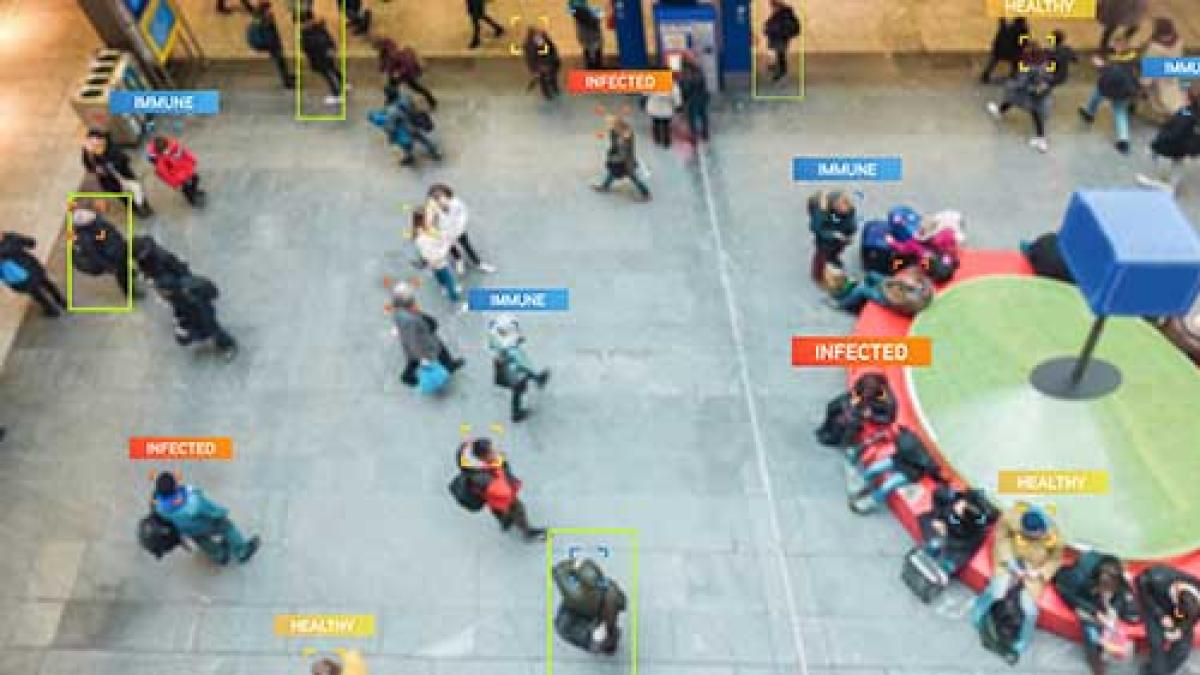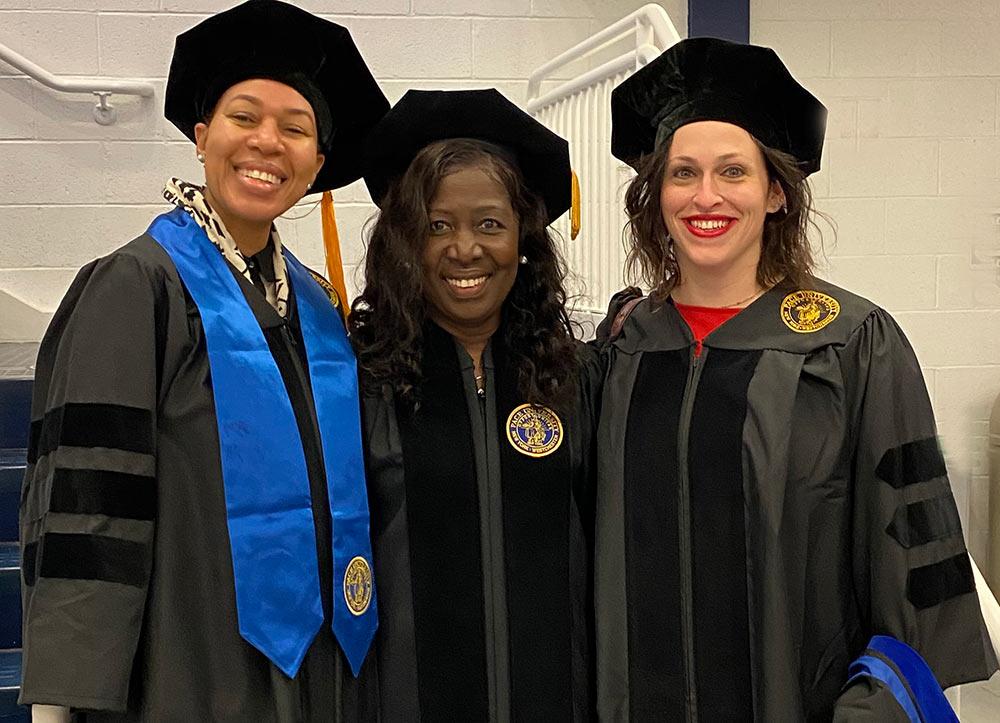
A Legacy of Hope and Inspiration: Dean Harriet R. Feldman
When does a career become passion? When you’re able to use your skills, talent, and education for the greater good. It’s something Harriet Feldman has been doing for more than five decades, starting from her graduation from a diploma nursing school.
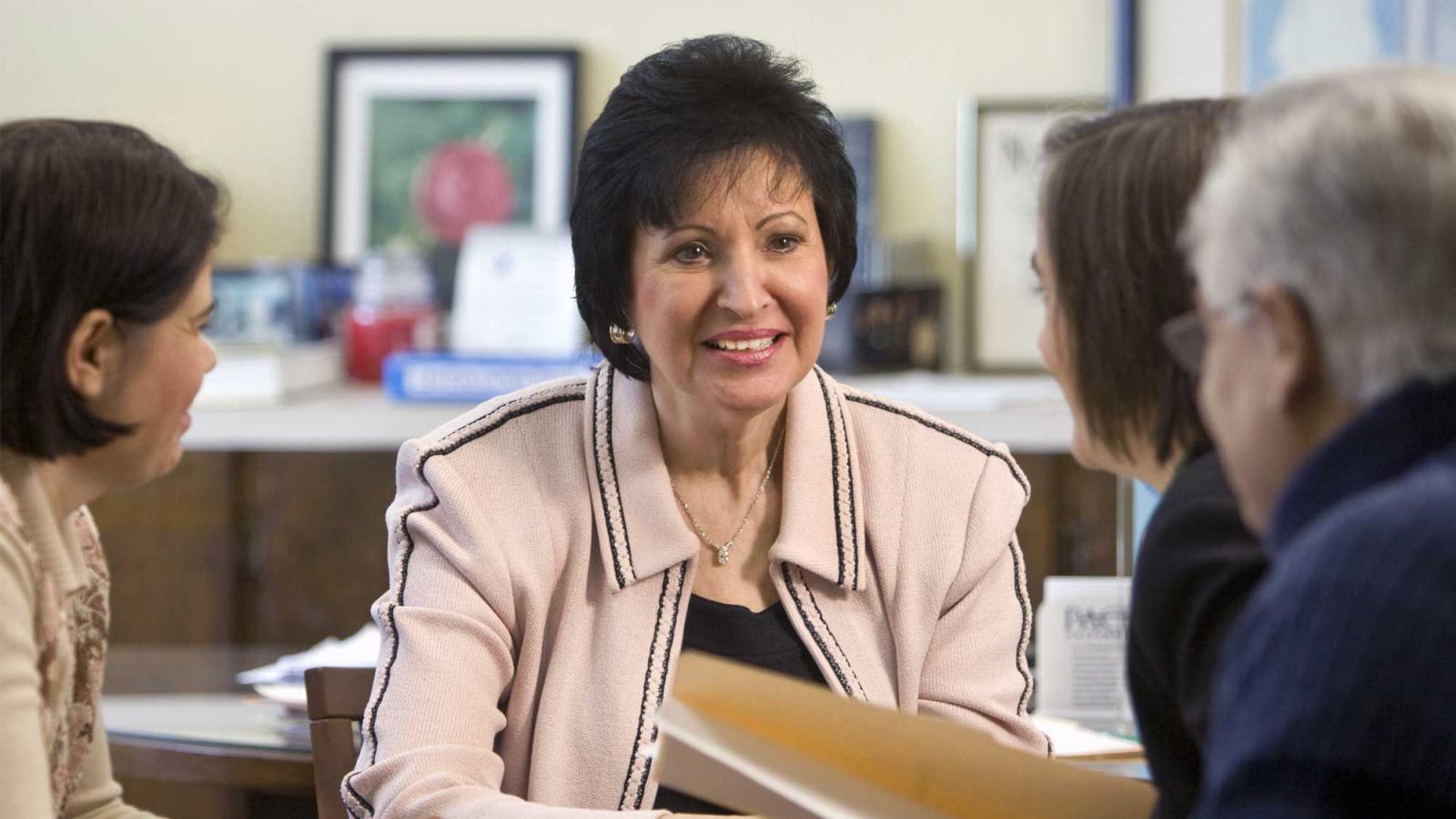
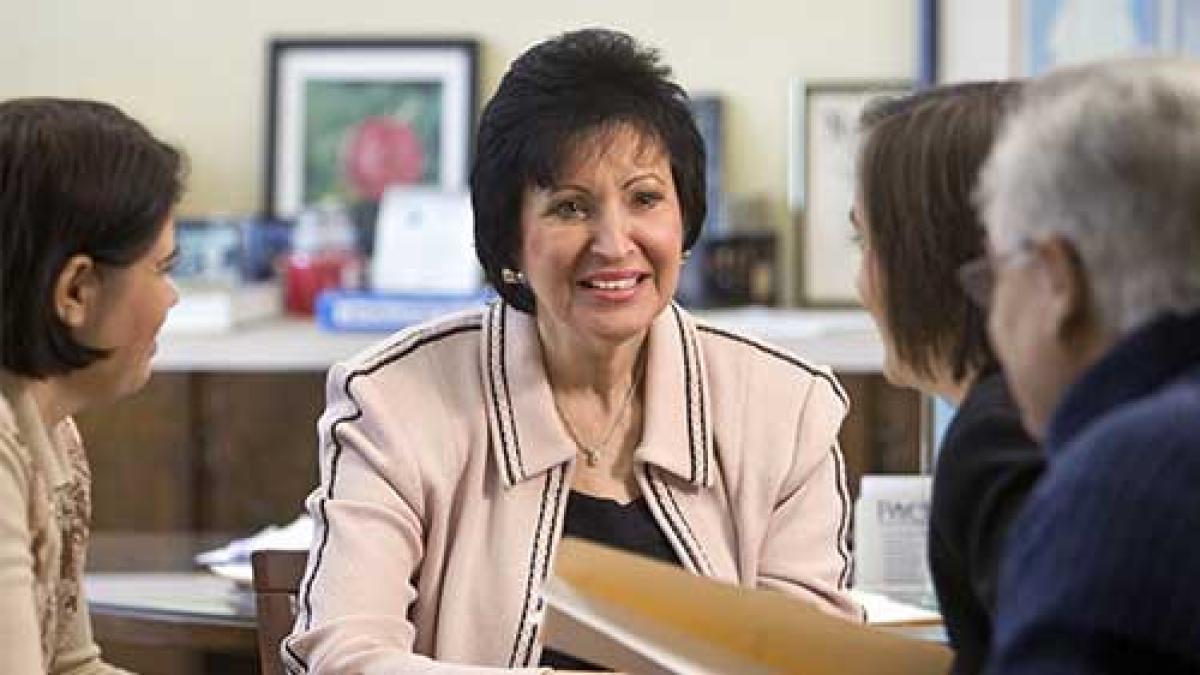
View the full issue of Pace Magazine.
When does a career become passion? When you’re able to use your skills, talent, and education for the greater good. It’s something Harriet Feldman has been doing for more than five decades, starting from her graduation from a diploma nursing school.
For 28 years, College of Health Professions (CHP) and Lienhard School of Nursing Dean Harriet R. Feldman, PhD, RN, FAAN, has served the Pace Community in innumerable ways. She was instrumental in reshaping the Lienhard School’s undergraduate and graduate programs, expanding the Family Nurse Practitioner and Accelerated BS programs to the New York City Campus, establishing two doctoral programs in nursing; developing the BS in Health Science program, adding five additional academic programs new programs in the College of Health Professions, and establishing a 5-year academic plan that includes the MS in Health Informatics program (in 2021–22) and Master of Public Health (in 2022–23).
During her time at Pace, she also raised nearly $25 million in external funding; securing two federal “earmark” grants to address the nursing faculty shortage as well as sparking interest in healthcare careers in middle school students (one of whom recently completed a DNP in Nurse Anesthesia!), and so much more. Through her dedication and leadership, she’s touched the lives of countless students, and in 2005, Dean Feldman and her husband, Ron, endowed a writing award for students in the Nursing program. Not to mention the fact that she has also served as interim provost and interim dean of the School of Education, proving herself ever ready and willing to step up when Pace students, faculty, and staff needed her guidance and expertise.
“Students who go through our programs develop meaningful mentor-mentee relationships with our faculty…and I am proud to be a part of their journeys and even more so proud of our faculty and school for their ongoing respect for so many important professions and community.”
That’s quite the resume for one person—and it’s still only a partial one! Her dedication to Pace is clearly undeniable, but few know that Dean Feldman started out where most of us do, as a high school student uncertain about the future. “In those days, women were typically encouraged to pursue just a few options,” she says. At the time, Dean Feldman was in advanced placement mathematics classes and worked in the department, even as a student. “I thought that I might want to be a math teacher,” she explains, “However, I was painfully shy, so the thought of standing up in front of a class to teach was very scary. Pretty funny when you consider that it is not unusual for me to present to groups sometimes in the hundreds and even thousands!”
It was her brother who would inadvertently open the door to what would become Dean Feldman’s storied career. He was dating a nurse at the time, and she spoke highly of a rewarding profession with potential to grow. “Little did I know I would fall in love with nursing in all of the paths I pursued,” says Dean Feldman. From bedside nurse to public health nurse to faculty member to administrator, her upward trajectory has benefited all those who she has served and worked alongside.
Before coming to Pace, Dean Feldman held faculty and administrative positions at Fairleigh Dickinson University, State University of New York at Farmingdale, and Adelphi University. She boasts a proven track record of leadership as well, as board member and board Chair of the Commission on Collegiate Nursing Education and board member of the American Association of Colleges of Nursing. She testified before the US Congress to convey issues surrounding the nursing faculty shortage and worked with Rep. Nita Lowey’s staff to craft legislation to address the shortage. She is a Fellow of the American Academy of Nursing, and the New York Academy of Medicine, and is a member of Sigma Theta Tau, the international honor society in Nursing. She is also a member of the Edward J. Mortola Heritage Society at Pace.
“Little did I know I would fall in love with nursing in all of the paths I pursued,” says Dean Feldman.
Dean Feldman further played a critical role in navigating the Pace Community through the COVID-19 global health crisis, serving as a member of the various COVID committees, and dedicated her time to mentoring CHP faculty through tenure and promotion and students eager to lend their skills in service to the school. “It is one of the highlights of our roles as educators that we can see the impact our programs and instruction has provided toward students entering the healthcare professions,” she said. “Students who go through our programs develop meaningful mentor-mentee relationships with our faculty…and I am proud to be a part of their journeys and even more so proud of our faculty and school for their ongoing respect for so many important professions and community.”
Recently, Dean Feldman received a “Changemakers in Healthcare Award,” an honor recognizing accomplished Pace alumni and friends in the healthcare and health services sector who exemplify the Pace ethos of success in their daily and professional lives by being at the forefront of creating opportunity for all. In addition, her exemplary career at Pace will be marked by a scholarship—the Dean Harriet R. Feldman Nursing Scholarship—which will aid doctoral students in the PhD in Nursing program who may need financial assistance in the pursuit of their education to be scientists, educators, and healthcare leaders.
And yet, her role in uplifting the Pace Community doesn’t stop there. As she looks to a new future of possibilities, Dean Feldman continues to express a desire to support Pace students, faculty, and staff. To the CHP community, she wrote a touching email that spoke to her pride in their work, and signed off not with a goodbye, but with a message of aspiration: “I look forward to the next phase of my career, hoping to continue to make additional contributions to Pace and professionally in the years to come.”
Dean Harriet R. Feldman will be stepping down from her position on June 30, 2021, but she will continue her legacy as a healthcare changemaker, and for that, we are ever indebted to her endlessly giving nature.
Dean Feldman Through the Years
A Hackathon for Everyone
What is a hackathon? It’s a timed, team-based problem-solving day of strategy and execution where tech is used to save the day. Teams, of all different skills and abilities, come together to design software or mobile apps to solve real world issues and problems.

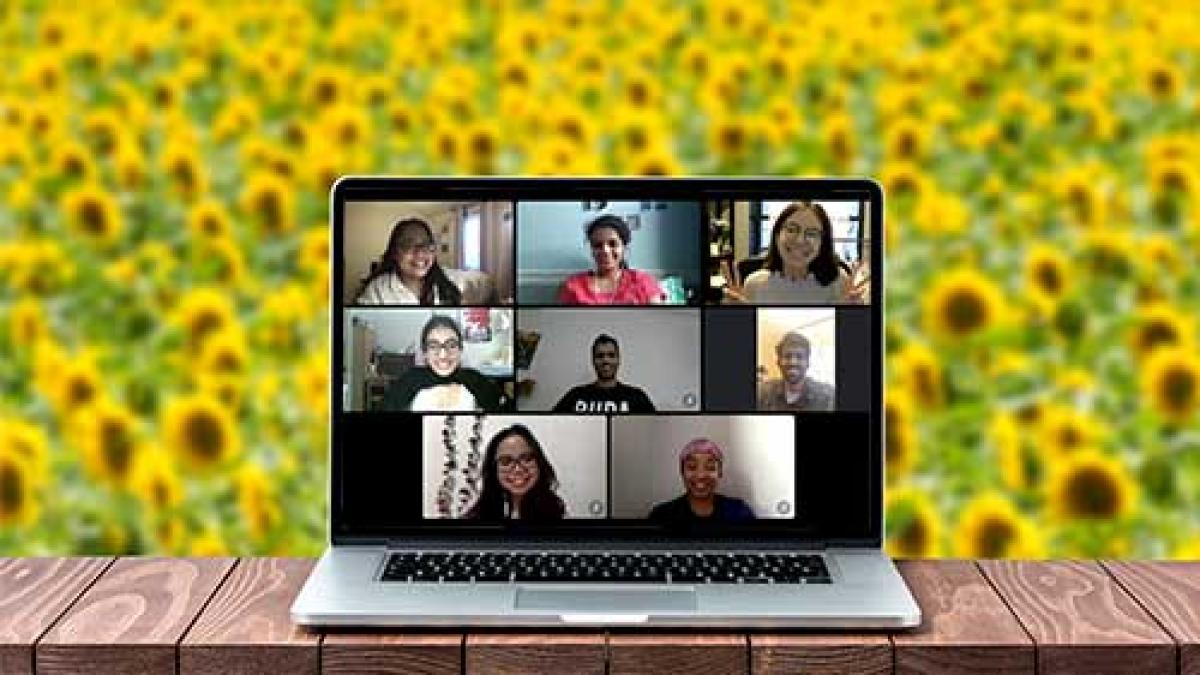
View the full issue of Pace Magazine.
What is a hackathon? It’s a timed, team-based problem-solving day of strategy and execution where tech is used to save the day. Teams, of all different skills and abilities, come together to design software or mobile apps to solve real world issues and problems.
In March, Pace Women in Tech, POP TV, and the Cybersecurity Club hosted the second annual Sunflower Hack, so named for the event's ability to attract people who stand out from the crowd, who are unique and different. This all-day hackathon (and first-student run hackathon) at Pace encourages participants to join no matter their level of coding experience. Teams, which consisted of 3-4 members, were tasked with creating an innovative solution centered around the theme of Interaction and Communication. Prizes were awarded to teams who excelled in categories including Best Entrepreneurial Hack, Crowd Favorite, Most “Out-of-the-Box” Hack, and more.
“The Sunflower Hack is testament to the inclusive attitude of Pace students,” said Katie Todd, assistant director of Communications and Strategic Operations and the staff mentor for Pace Women in Tech. “By inviting participants from all backgrounds and not just Seidenberg students, the organizers got to demonstrate how exciting hackathons can be—and how it’s all about teamwork and ideas, not necessarily coding. I’m so proud of Pace Women in Tech and all they have achieved.”
“The Sunflower Hack is testament to the inclusive attitude of Pace students,” said Katie Todd, assistant director of Communications and Strategic Operations and the staff mentor for Pace Women in Tech.
Recent graduate Angela Bonsol ’21, one of the organizers of Sunflower Hack, viewed the experience as one of the highlights of her undergraduate career—and will reflect positively on her role in actively building this grassroots event.
“Sunflower Hack will always be in my heart,” she said. “Being part of the organizing team for two years has been an honor.”
Although the event was conducted virtually this go-around on a designated Discord server, it was able to effectively build upon the momentum from the inaugural Sunflower Hack held in February 2020—thus positioning the event for even greater success over the next few years.
PHD Program Celebrates its First Graduates
In May 2021, Pace University’s College of Health Professions PhD in Nursing Program marked its first commencement ceremony with three graduating students. The graduates, triple Pace alumna Chava Pollak, Michele Flynch, and Delores McGregor were recognized at an in-person hooding ceremony on the Pleasantville Campus attended by PhD faculty, who hooded the graduates.
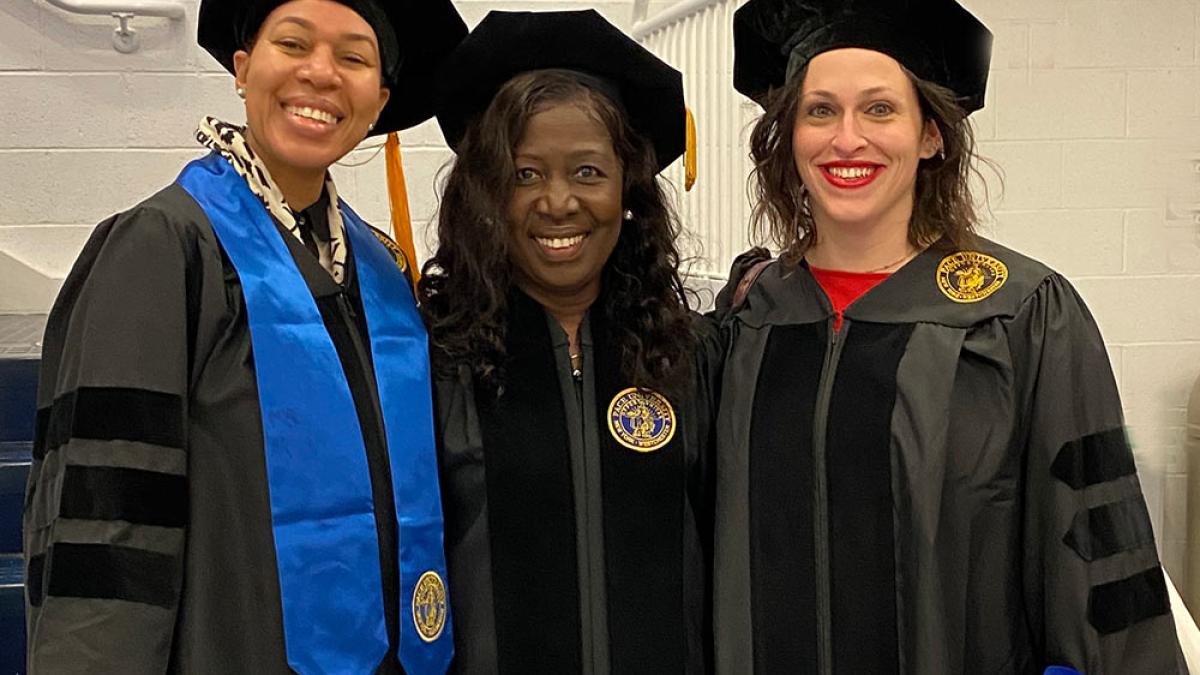
In May 2021, Pace University’s College of Health Professions PhD in Nursing Program marked its first commencement ceremony with three graduating students. The graduates, triple Pace alumna Chava Pollak, Michele Flynch, and Delores McGregor were recognized at an in-person hooding ceremony on the Pleasantville Campus attended by PhD faculty, who hooded the graduates. Two to three additional students are anticipated to graduate in August 2021.

The PhD in Nursing is an innovative, research-intensive experience that is the only program of its kind in the mid-Hudson region. This program welcomed its first cohort in fall 2017. The program, which emphasizes research focusing on primary health care, educates students to be nurse scientists. Sharon Wexler, PhD, RN Professor and Chairperson of the PhD Department, explained, “Our students’ research focuses on the full range of healthcare factors from prevention to treatment of illness. The purpose of our program is to prepare nurses who will be scientists, leaders, and educators.”
"Each graduate is ready to conduct research, discover new knowledge that will impact patient care, and become a steward of the profession.” - Sharon Wexler, PhD, RN, Chair, PhD Department
For Chava Pollak, that research involved the care of older adults and utilizing different technologies to improve their lives. Her dissertation project investigated the impact of robotic pets on social and physical frailty in older adults living at home.
She attributes her success in the program to having an incredible mentor. “I was introduced to Dr. Wexler during my undergraduate years at Pace. Since 2013, she guided me toward a career in nursing research and has been a constant source of support and wisdom ever since. Through Dr. Wexler’s work, I discovered my passion for caring for older adults, a path I’ve continued on ever since.”
According to Pollak, completing the program changed the way she thinks about nursing and the way she thinks as a professional. “I learned tangible skills such as research design, for example, but more importantly, I learned to think like a nurse scholar.
Pace is committed to strong community involvement within all of their programs, a fact that graduate Michelle Flynch recognized. “Having a leader who truly cares about diversity made the experience gratifying,” she said. “I was able to interact and share ideas with women from different racial and ethnic backgrounds.This enriched my knowledge base and broadened my perspectives.” Flynch felt encouraged and empowered through the experience because, she said, her mentor was “honest, knowledgeable, and supportive.” She credits this with contributing to her success in the program and in her research.
Flynch’s study was a qualitative hermeneutic phenomenological study that explored the lived experience of family members with loved ones who had a physical restraint intervention in the ICU. “The faculty community in this program has challenged, inspired and adapted to the needs of the students to create a successful program. I’m very proud of that,” she said. Flynch explained how the program educated her as a nurse scientist, advancing her practice as an educator, researcher, and a provider of care. This program equipped her to work on advocating for policy changes in nursing and health care.
Graduate Delores McGregor conducted a qualitative descriptive study to explore the experiences of family caregivers of children with intellectual disability, living in low socioeconomic communities.
McGregor considers herself fortunate to have had world-renowned qualitative research scientist, Keville Frederickson, EdD, RN, FAAN, founding director of the PhD Program, as her mentor at Pace. Delores explained that Dr. Frederickson’s expertise gave her guidance throughout the program and in her research. “All the faculty members I encountered at Pace University were supportive,” said McGregor.
“Each graduate is ready to conduct research, discover new knowledge that will impact patient care, and become a steward of the profession,” said Wexler. Our graduates are prepared to respond to complex needs related to population health.”
The Professor Is In: Ric Kolenda
Dyson Clinical Assistant Professor Ric Kolenda has been named a 2020–2021 Wilson Center Faculty Fellow, and is focusing his research on ways to better empower gig economy workers. This month, he chatted with Opportunitas on the state of the gig economy, the pandemic, and potential for policy changes and an improved entrepreneurial economy.
Dyson Clinical Assistant Professor Ric Kolenda, PhD, has focused much of his academic research on the gig economy—an ever-growing, and as the pandemic has underscored, an essential component of our economy. This year, he was awarded a fellowship from the Wilson Center of Social Entrepreneurship, and his research topic, "Empowering Entrepreneurship: Platform Cooperatives as Pathways from Gig Work to Sustainable Careers," will focus on how platform cooperativism can reduce inequality and create improved social conditions and opportunities for wealth creation for workers.
This month, Kolenda talked with Opportunitas about his work, the state of the gig economy today, and much more.
How did you first become interested in researching the gig economy?
I have a background in doing freelance and consulting work—the idea of the freelance economy that has blossomed into the gig economy was something I have been always interested in, and as an academic who studies employment and job development, it’s always made sense as an area of interest.
There have been some recent surveys—the census just did an update on a survey I had written on in the mid-2010s that’s looking at the broader alternative work arrangements situation. I was interested in updating that work, and this year, it came into focus even more so because of the impact of COVID-19 on gig workers—especially the platform workers that we often associate with what we call the gig economy; platforms being the digital platforms like Uber, Lyft, DoorDash, etc.
When the Wilson Center fellowship came up, I wanted to find an angle that was within this work but specific to the idea of social enterprise, and what I stumbled upon was this idea of platform cooperatives. What I like about it, is that it combines an earlier interest of mine in worker ownership and worker cooperatives as an alternative to corporate capitalism or state socialism.
I wanted to look at how this platform cooperativism approach would address some things I’ve been generally looking at within the gig economy, which is how to reduce the precariousness of the gig worker—maintaining the flexibility while providing more security.
In what ways can platform cooperativism better empower gig economy workers?
Platform cooperativism is a subset that specializes in worker-ownership for work done using digital platforms. One of the main things the platform cooperativism group talks about is the fact they offer alternatives to platform capitalism, in that they’re focusing on benefitting not just the shareholders, but the stakeholders—in other words, the workers themselves.
So, it’s a more democratic way to organize the entity, that also focuses on fairness for those workers—it’s more focused on how to create equity amongst its members and stakeholders. It’s democratic economically and socially.
How has the pandemic altered or confirmed your research hypotheses, and general outlook on the gig economy?
Gig workers have been hit particularly hard in many ways during this crisis. Many lost their work completely when the pandemic hit—and as you know, in the gig economy, if you don’t work, you don’t get paid.
One positive public policy change that happened early on was that the CARES Act—the initial stimulus for the COVID crisis—did include gig workers in its unemployment benefits. For the first time ever [and again in the recent extension of these benefits], these contingent workers, alternative work arrangements, whatever you’d like to call it—they were able to get unemployment insurance benefits. So that was helpful.
We already have the Affordable Care Act, which provides the ability to get health insurance when you don’t have employer insurance, that's another piece of the puzzle. The fact that public policy took that into consideration I think was helpful.
It also helped that gig workers who didn’t lose their work during COVID-19 had a lot more work. Many were considered essential workers—food delivery, for example, was put under stress. There were folks who were working too much and were more exposed to the virus in their work. That became known in the public policy sphere, and so, we need to address those things. The dependence that we’ve realized we’ve had on gig workers has made people generally more aware and more empathetic toward the gig economy in ways that might influence public policy.
But the reality is, most advances only happen—as any labor organization knows throughout the last century or so—through struggle, through conflict. What we’ve seen increasingly is organizations and workers who have been trying to use their power by organizing to put pressure on public policy and corporate entities to change their policies. One recent example of this is in Austin, TX, where in 2016, taxi drivers revolted over policies imposed by traditional taxi franchises, and formed a co-op to compete with them. Since then, at least one of the remaining three competitors has closed, while ATX Co-op Taxi is still going strong, even after the state overrode local regulations on ride-hailing companies. We are now seeing a similar effort with the Drivers Cooperative in NYC.
As the gig economy continues to grow, do you think there will be growing pressure for changes in policy?
I think we will see more policies protecting gig workers. The passage of Prop 22 in California, which would have forced companies to treat workers as employees instead of independent contractors, means that states may be more hesitant to pass laws tying workers more closely to employers, but this could also put pressure on the federal and state governments to offer more direct protections for these workers.
This could also mean that private employers could offer benefits to fend off laws that could force them to do so, in the same way the threat of unionization pressures companies to improve labor relations. But the alternative is, if they don’t do those things, there is this threat of not only direct action, but also taking their labor, and working together to create alternatives to companies that currently don’t exist.
Finally, we could see more workers organizing to take on employers, using a combination of traditional labor organizing methods and the threat of moving to worker-owned cooperatives, such as the kind I am studying for the Wilson Center Fellowship.
Anything else you'd like to add?
I want to make sure that we deal with these equity and fairness issues and reduce precarity. But I also want to take a step back and ask, “what is society missing out on by not taking care of these workers?”
Freelance and gig work can be a great boon to both our economy and to workers themselves, but we must make it easier for workers to earn a decent wage while getting the benefits afforded workers in traditional work arrangements.
One of the things I’d like to see is to use the freelance economy as a bridge to creative entrepreneurship. By freeing workers from their employers, while getting many of the benefits we’ve generally associate with full-time employment, we can reduce the risk slightly, thereby creating a new generation of entrepreneurs who can bring their creativity to the marketplace.
New Board of Trustee Appointments
Three leaders with diverse backgrounds and a broad range of expertise in healthcare, technology, and business operations have joined Pace University’s Board of Trustees.

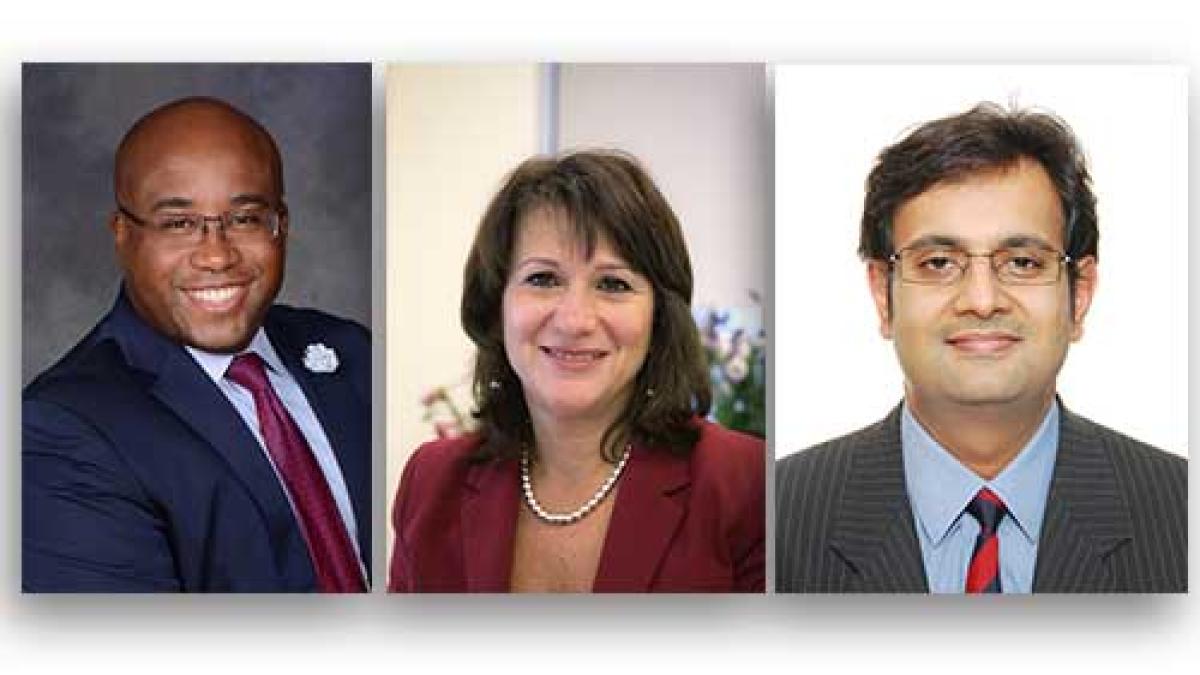
View the full issue of Pace Magazine.
Three leaders with diverse backgrounds and a broad range of expertise in healthcare, technology, and business operations have joined Pace University’s Board of Trustees.
The new trustees are: Marki Flannery, former president and chief executive officer of the Visiting Nurse Service of New York; Christopher Roker MBA ’07, CEO and chief growth officer of NYC Health + Hospitals/Lincoln; and Hemant Khemka, managing director at Stesalit Group, a global technology and manufacturing group based in India.
Mark Besca '81, chair of Pace's Board of Trustees, said each new trustee brings a wealth of experience, professionalism, and energy — and all three are committed to Pace’s mission of Opportunitas, or creating opportunities for its diverse student body.
“Marki, Chris, and Hemant understand that a Pace education opens doors for our students and creates opportunities for them over the course of a career and a lifetime,” said Besca. “We welcome their broad range of experiences, and we are excited that their input and vision will be help guide Pace students for generations to come.”
Flannery and Khemka, whose son is in the Pace Class of 2022, were elected to the board in March. Roker, an alumnus, was elected to the board in May.
The new trustees are joining the board at an exciting juncture at Pace University. Pace is in the midst of adding 12 new online graduate programs that align with growing market demands; remaining hyper-focused on experiential learning, career readiness, diversity and inclusion, and providing a strong return on investment to its students while investing significantly in its nationally acclaimed programs such as its School of Performing Arts, College of Health Professions, Seidenberg School of Computer Information Systems, and the Elisabeth Haub School of Law, which this year was ranked as the No. 1 environmental law program in the country.
Furthermore, Pace is transforming Lienhard Hall, home to its College of Health Professions on the Pleasantville Campus, into a modernized Healthcare Hub that will add important programming for students preparing for careers in the region’s burgeoning healthcare and biotechnology sector.
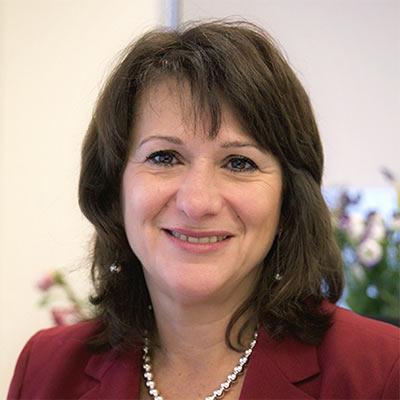
Marki Flannery served as president and chief executive officer of the Visiting Nurse Service of New York (VNSNY). In this position, she oversaw the largest not-for-profit home- and community-based health care organization in the United States. With annual revenues of approximately $2.3 billion and over 10,000 employees, VNSNY serves the five boroughs of New York City, Nassau, Suffolk, and Westchester Counties, and parts of upstate New York. VNSNY typically has over 44,000 patients and members in its care, and offers a comprehensive array of programs and health plans designed to meet the diverse health care needs of their patients and members. Although she retired earlier this year, Flannery serves as an executive consultant to VNSNY’s CEO. She earned her bachelor’s and master’s degrees from New York University. Flannery is married, has two adult sons, and lives in Palisades, NY.
“I’ve always been so impressed by the students, graduates, staff and organization as a whole,” Flannery said. “I’m really excited to be joining the board and to make a meaningful contribution to Pace University.”

Hemant Khemka is the managing director at Stesalit Group, a global technology and manufacturing group based in India that focuses on making electronic and sensor based products in the areas of transportation and automation, AI solutions for Imagery Analytics and Dashboards for Internet of Things (IOT).Stesalit group includes companies such as Stesalit Systems, Stesalit Infotech and Stesalit Automation etc. As managing director, Khemka is responsible for strategic planning, product development, and marketing.In the future, the company expects to expand into more sensor-based products and solutions with a large focus on the internet of things – IOT. He previously worked for Credit Suisse in lower Manhattan, and holds a BBA from Adelphi University. He is a founding member of the Kolkata Chapter of the Entrepreneurs Organization and an active member of the Young Presidents’ Organization. He lives in Kolkata, India, with his wife. They have two children, including a son who is studying Computer Science at Pace University.
“I’m really excited to join Pace University’s Board of Trustees,” said Khemka. “I hope to help and contribute to the University’s overall vision and strategic direction. There is a lot we can do to position Pace as a global brand. We are positioned so beautifully in a location that is the envy of the world.”
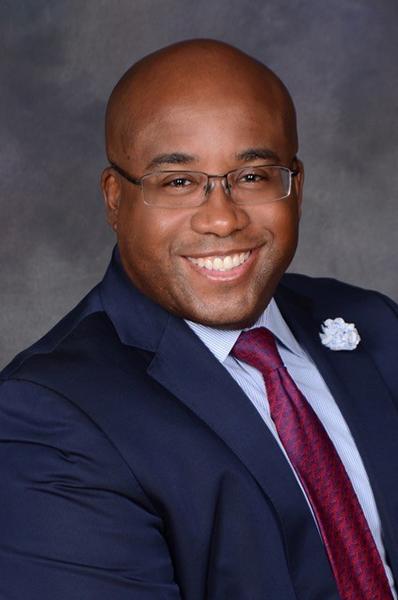
Christopher Roker serves as CEO, NYC Health + Hospitals/Lincoln and as the health system’s Chief Growth Officer. He previously served as NYC Health + Hospitals/Queens and Metropolitan CEO. Under Roker’s leadership, the hospital has achieved an increase in patient satisfaction scores, inpatient discharges, outpatient volume, and operating room (OR) volume. He has also been credited for strengthening collaborations with physician, labor, and community partners. Prior to NYC Health + Hospitals, Roker held leadership positions at The MetroHealth System in Ohio, St. Barnabas Hospital in the Bronx, Beth Israel Medical Center in Manhattan, and The Parkway Hospital Queens. He holds a Bachelor of Arts from The State University of New York (SUNY) at Oswego, an MBA from Pace University, and a Certificate in Healthcare Leadership Advancement from Cornell University. He lives in Scarsdale, N.Y., with his wife, and they have a son.
“I know first-hand the power of education and the importance of Pace University’s mission of Opportunitas,” said Roker. “I’m excited to join the Board of Trustees and help make a significant contribution to the students we serve.”
More from Pace Magazine
When does a career become passion? When you’re able to use your skills, talent, and education for the greater good. It’s something Harriet Feldman has been doing for more than five decades, starting from her graduation from a diploma nursing school.
As the COVID-19 pandemic took hold of the world, the intersection between public health, safety, technological data, and the law became rather complicated. These questions prompted Joseph Peterson '22 to formulate a research topic titled “Who Has Your Health Data, What Are They Doing with it, and What Can You Do About it?: Legal and Technological Issues Related to Contact Tracing of COVID-19 Infections.”
What is a hackathon? It’s a timed, team-based problem-solving day of strategy and execution where tech is used to save the day. Teams, of all different skills and abilities, come together to design software or mobile apps to solve real world issues and problems.
The Future of Work
The times, they are a-changing. If rapid advances in technology and healthcare and massive changes in climate and community life were not already fundamentally altering how we live and work prior to this past year, the COVID-19 pandemic has certainly kicked these shifts into high gear.


View the full issue of Pace Magazine.
The times, they are a-changing.
If rapid advances in technology and healthcare and massive changes in climate and community life were not already fundamentally altering how we live and work prior to this past year, the COVID-19 pandemic has certainly kicked these shifts into high gear.
This was the primary subject of discussion on an unseasonably warm Thursday in the beginning of April, when Pace hosted The Future of Work, an interdisciplinary online conference that featured panel discussions and faculty research presentations which touched upon subjects ranging from how communities and regions will increasingly be impacted by changing climates, to the degree in which remote work will dictate fundamental alterations in the workplace and beyond.
The event was headlined by keynote speaker Nicholas Donofrio, IBM fellow emeritus and former executive vice president of innovation technology, who discussed the role of and continued evolution of artificial intelligence, and how AI will impact the ways in which we work and view the world.
"The Future of Work Conference was the beginning of an ongoing conversation about how we create new programs by allowing faculty to discuss their scholarship with the whole Pace Community,” said Associate Provost of Research Avrom Caplan, PhD. “While the future of work itself may veer in many unpredictable directions, our interdisciplinary conference will help to position Pace as a leader in this important discussion."
Monster featured Dyson Professor Jennifer Magas in "10 things to do senior year of college to set yourself up for career success"
Avatars for OASIS
The School of Education has combined forces with Pace's OASIS program to get students on the autism spectrum career-ready by using virtual reality avatars to simulate a job interview scenario.


View the full issue of Pace Magazine.
“Eighty-five percent of graduates with autism nationally, are not gainfully employed within five years of graduation. Those are scary statistics,” says Jennifer Pankowski, EdD, a clinical assistant professor at Pace’s School of Education. “So, I thought we could use the avatars from the School of Ed to address some of hurdles that our OASIS students are facing.”
Designed for students with high-functioning autism spectrum disorders, learning differences, and nonverbal learning differences, Pace’s Ongoing Academic and Social Instructional Support (OASIS) program is one of the most comprehensive support programs in the country. The support OASIS offers students on the autism spectrum doesn’t stop at the classroom doors—it’s now branching out into the professional world.
“So, I was like, here's a wild idea: Can we try avatars?”
For Pankowski, her research into autism brought to light a pattern for folks on the autism spectrum. “What we were seeing was that they do really well in their coursework, they graduate, they graduate with a high GPA, you know, over 3.0,” she explains. “But they're not getting jobs.”
Through her work with kids and young adults on the autism spectrum, Pankowski knew that sometimes it was easier to connect with a non-intrusive, borderline humanistic situation. That’s where the use of immersive virtual reality avatars comes in.
“I started working with Anthony Martino, the Internship and Career Coordinator for the OASIS Program, who explicitly works with OASIS students. Career Services does a great job at coaching and other programs, but there was a disconnect here,” she says. “So, I was like, here's a wild idea: can we try avatars?”
Pankowski and Martino thought they would give it a try and start with the humanistic VR avatars and then work backwards to face-to-face human interaction, all the while preparing the OASIS students for landing a job after graduation.
“The avatars are basically computer-generated people in a virtual setting—in this case, an office—and they are operated by a real human, miles away,” explains Martino. “So, our students would enter the virtual job interview scenario and do a mock interview with the avatar.”
The mock-interview scenario is thought out to the very last detail—including being invited by a virtual assistant to wait in a virtual lobby until it’s time to go in to meet their virtual interviewer. The sessions are recorded and shared with the students after so that they can get a better sense of how well they did or the things that they need to improve for next time.
“Part of being a member of the Pace Community is getting ready for a career, landing an internship,” says Martino. “This is absolutely supporting that mission.”
“We asked the same questions that they asked in their mock interviews on campus, but with an avatar,” says Pankowski. “And all of a sudden, they came alive. Anthony couldn’t believe it.”
For her, it made perfect sense—an avatar is not threatening, it’s not a human who can stand up in front of a student and say, ‘How could you say that?’ The virtual distance created an opportunity for these students to really open up.
“Part of being a member of the Pace Community is getting ready for a career, landing an internship,” says Martino. “This is absolutely supporting that mission.”
In the interview scenarios, students were able to articulate their needs in the workplace. Students explained that they need clear expectations from their employers, expressed the need for straightforward directions and deadlines, and how they sometimes struggle when those instructions aren’t clear.
“The students are even doing things like self-advocating,” explains Pankowski. “They were saying, ‘Hey, I'm an asset to your company. These are the things that I need as an employee. And if you give these little things to me, I can do really well.’”





